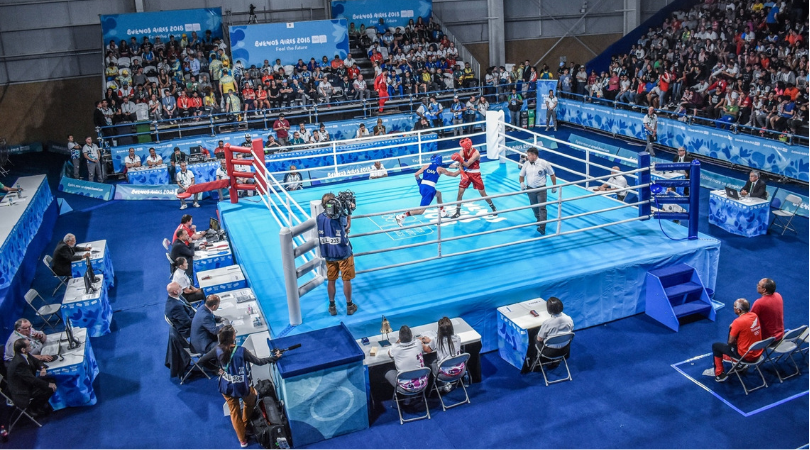Boxing
Amateur boxing in troubled waters over likely AIBA suspension

The World Amateur Boxing is clearly fishing in ‘troubled waters’ with the International Olympic Committee (IOC) – the organisers of the Olympics – upping the ante to stop the International Boxing Federation (AIBA) – the amateur boxing governing body – from conducting the boxing event at the 2020 Tokyo Olympics.
Of course, it needs little emphasis that the IOC and AIBA have been at loggerheads for a long time now, with the former consistently raising concerns over the way the latter has been running the amateur boxing affairs over the past many years. The World Olympic body has voiced strong reservations over AIBA’s governance, financial mismanagement as well as integrity of judging and refereeing.
And to call a spade a spade, the AIBA on its part, has cut a sorry figure – in fact, the rot had well and truly set in during the eleven-year term (from 2006-2017) of AIBA President Wu Ching-Kuo – his stint was replete with plethora of controversies be it financial mismanagement or poor refereeing/judging. It was during Wu’s stint that the AIBA had accumulated a debt of 15m Swiss francs through poor financial management and auditing.
It will not be incorrect to suggest that Wu ran the AIBA affairs like his fiefdom and even not hesitating to remove members of AIBA’s executive committee, who either challenged his leadership or raised questions about financial irregularities in AIBA. And to cite an example, one AIBA’s executive committee member who questioned Wu was deposed but was dramatically reinstated by Swiss courts.
How can one forget the 2016 Rio Olympics, where a number of bouts set the tongues wagging about whether amateur boxing was indeed plagued by corruption? Rewind to the bantamweight quarterfinal between Ireland’s Michael Conlan and Russia’s Vladimir Nikitin – a bout where Conlan appear to be a clear winner even though the referee thought otherwise. What’s more, hugely frustrated with the end decision, Conlan reacted by raising his middle finger at officials and attacked amateur boxing officials of indulging in corruption. There was more drama in Rio as a number of judges in Rio were sent home for poor officiating.

The tenure of Wu clearly sowed the seeds of never-ending turmoil in AIBA – brazenly it may seem – he remained defiant even as the AIBA’s executive committee approved a no-confidence motion against him for mismanaging AIBA’s financesin mid-2017. But he knew that the writing was on the wall for Wu and he stepped down in November 2017.
The ugly tale of events at AIBA was not over with the exit of Wu. The election of Uzbekistan’s Gafur Rahimov as new AIBA President in November 2017 saw the amateur boxing body press the ‘controversy’ button time and again. Like the IOC was far from comfortable with the stint of Wu, they had made their displeasure known over the election Gafur Rakhimov – an Uzbekistan businessman who is reportedly on a U.S. Treasury Department sanctions list for suspected links to organised crime and international heroin trafficking – hestep down as AIBA President after barely four months in March 2018. Surely, for Morocco’s Mohamed Moustahsane – the elected AIBA Interim Presidentin March 2019 – this is clearly not the most ideal time to take charge of the AIBA affairs.
The wrongdoings in the AIBA have thrown up many questions over the future of amateur boxing. However, the IOC has made it crystal clear that although they have issues with AIBA, they would not allow amateur boxing to suffer. The world Olympic body is keep boxing a part of the Olympic programme as the sport has a huge fan following, is a broadcasters’ delight and has seen increasing global participation over the years. For the record, boxing had 76 nations competing in 13 medal events (in 10 men’s weight categories and in three women’s weight categories) at the 2016 Rio Olympics - the Tokyo Olympics is set to feature the same number of events like the 2016 Rio Olympics – the only difference is that men’s weight categories have been pruned down to eight (from the earlier ten weight categories), while the women’s weight categories have been increased to five (from the earlier three weight categories).
Of course, the ongoing tussle between IOC and AIBA has created a bit of uncertainty over how amateur boxing will move forward. Things even get confusing because the IOC has been categorical that the upcoming AIBA Men’s World Boxing Championships and the AIBA Women’s World Boxing Championships (both to be held in Russia in September and October) would not be considered as an ‘Olympic Qualifier’.
And from the Indian boxing perspective – a sport where India seriously backs itself to get medals at the Olympics – the logjam between IOC and AIBA must certainly be ‘uncomforting news’ but the country apex boxing body – Boxing Federation of India (BFI) feels that Indian boxers don’t have to break sweat over the latest off-the-ring developments. “All these off-the-ring happenings are highly unfortunate but our boxers are prepared like we are for every Olympics. As far as Olympic qualifying events are concerned, the IOC will appoint a taskforce that will organise the men’s and women’s Olympic qualifying competitions from January to May 2019,” said Boxing Federation of India (BFI) Secretary General Jay Kowli.
On the ring front, Indian pugilists appears focussed on what they knows best – punching to glory – a rich haul of 12 gold medals out of 18 gold medals on offer at the 2nd Indian Open Boxing Tournament in Guwahati is a fair indication of the fact that our boxers are bracing up not just to clear the Olympic qualifying hurdle, but also determined to make a big splash at the Tokyo Olympics, even as the IOC readies to suspend AIBA at its June 24-26 annual meeting.






